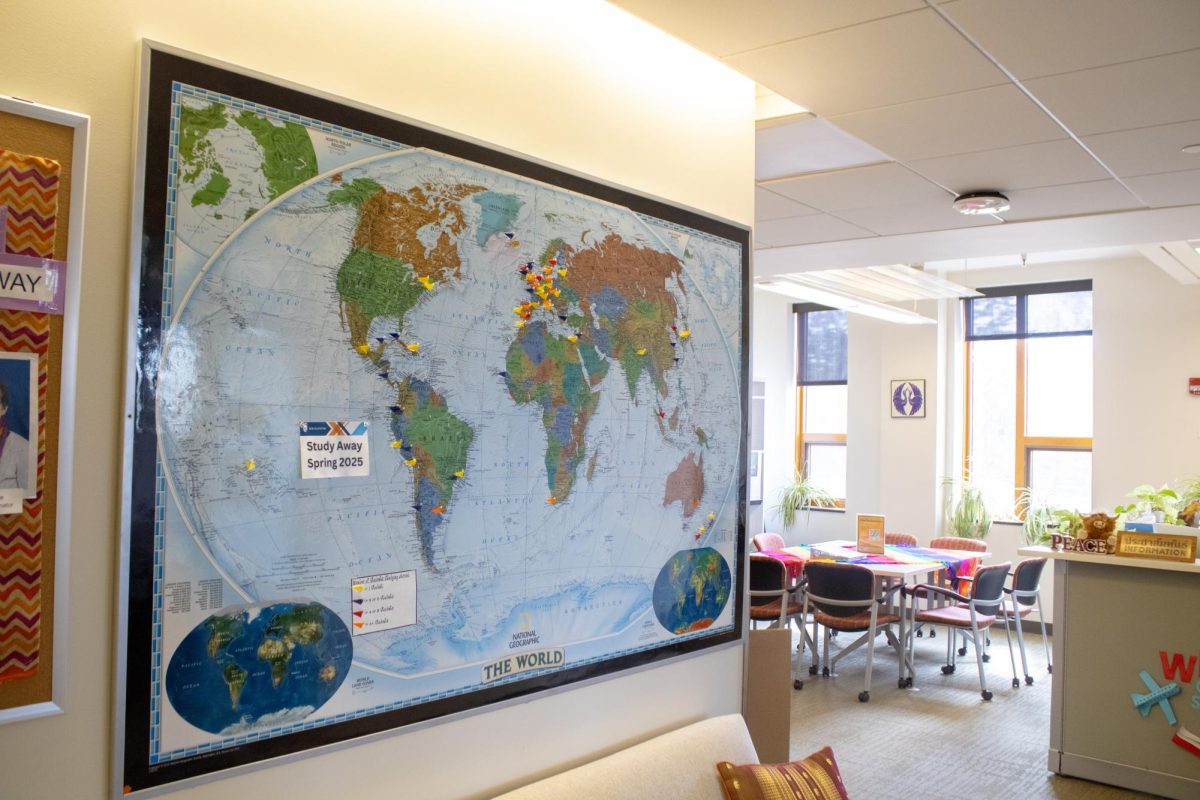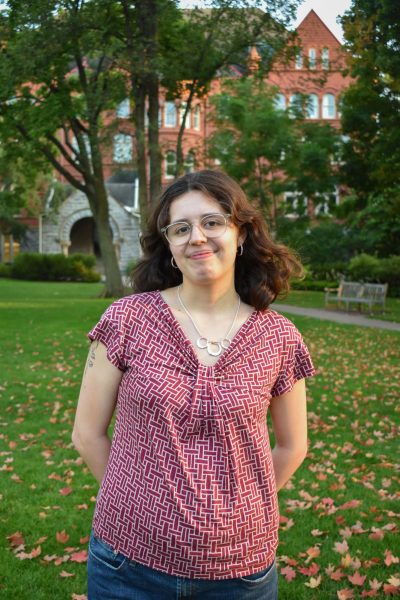On Tuesday, April 8, Macalester’s faculty made a definitive decision on the first request of Mac for Palestine’s academic divestment proposal: for Macalester to remove the Hebrew University of Jerusalem and the University of Haifa from the Center for Study Away’s pre-approved list.
With 75 faculty members in favor of delisting the two universities and 82 opposed, the vote concluded the April faculty meeting and the nine-month-long deliberation process that began when Mac for Palestine submitted its proposal to the Board of Trustees (BoT) on June 4, 2024.
OSB ’26, a member of Mac for Palestine and one of the authors of the proposal to end institutional sponsorship of study away programs in Israel, sat alongside an estimated 30 students who attended the faculty meeting in support of delisting the universities. Coming into the meeting, OSB anticipated a close vote.
“People were engaging, asking better questions [and] genuinely wrestling with the stakes,” OSB wrote in an email to The Mac Weekly. “I had no illusions that we’d win easily — but I also knew this wasn’t a fringe proposal. Minds were changing. The proposal failed by just seven votes. That’s not rejection — that’s movement.”
At last month’s faculty meeting on March 11, Erik Davis, chair and professor of the religious studies department, ended the meeting with a motion to delist the Hebrew University of Jerusalem and the University of Haifa from Macalester’s pre-approved list. Before voting at this meeting, faculty members debated the motion for roughly 50 minutes. For many at the April faculty meeting, this debate was only the most recent of many.
Before the proposal to remove the two programs from the pre-approved list came into the faculty’s hands, it first had to be submitted to the BoT and then reviewed by the Social Responsibility Committee (SRC).
On June 5, the SRC concluded that delisting programs from the pre-approved study away list was considered a curricular issue, and therefore fell under the jurisdiction of the Educational Policy and Governance Committee (EPAG). After deliberating at their meetings for four months, EPAG then voted, also with a five-to-four majority, to present their resolution before the faculty for approval at the April faculty meeting.
When Mac for Palestine learned that the decision to delist would come down to a faculty vote, representatives began holding individual meetings with professors in various departments.
“These conversations were everything,” OSB wrote. “An academic boycott isn’t always intuitive — honestly, it wasn’t for me when I first started learning about Palestine. It took real study, real care and real listening to understand just how deeply institutions like Hebrew University and the University of Haifa are tied to the Israeli occupation forces, to the machinery of apartheid and to the ongoing genocide in Gaza.”
The University of Haifa and Hebrew University of Jerusalem both host the Israeli Defense Force’s (IDF) military intelligence program called ‘Havatzalot,’ meaning ‘Lilies.’
Additionally, members of Mac for Palestine delivered a letter and physical copy of their proposal to every member of faculty, according to OSB.
The second person to speak on the motion to delist the two universities was professor of Classical Mediterranean and Middle East Studies Nanette Goldman, who has worked in Israel during multiple summers over the course of 25 years. Goldman referred to the proposal to delist the two universities as an “assault on higher education and academic freedom” in the typed copy of her remarks that she emailed to The Mac Weekly following the meeting.
“We cannot let ourselves imitate the [President Donald] Trump policy of vilifying and sanctioning legitimate and esteemed places of higher learning, simply because a portion of their practices clash with our beliefs,” Goldman read. “If our students want to study in Haifa and Jerusalem, Macalester should empower them to do so.”
Goldman also argued that studying away at the University of Haifa and Hebrew University of Jerusalem offers students more opportunities to support peace in the Middle East than if they remained in Minnesota. Goldman pointed to courses at the University of Haifa taught by both Palestinian and Israeli faculty, as well as the college’s Israeli Arab population. As of 2018, the University of Haifa reported a 41.1 percent Israeli-Arab student population.
Other faculty members expressed concern that the delisting of these two programs would devolve into removing programs entirely, and identified delisting as censorship. Some identified this censorship as rooted in a sense of fear and isolation amongst Zionist Jewish students and staff, while others claimed it impinged on the Classical Mediterranean and Middle East studies academic programs and functioning.
OSB, conversely, sees these assertions as an attempt to leverage individual concerns over the lives of Palestinians.
“Even more disturbing was the return of a familiar — and deeply harmful — conflation: anti-Zionism with antisemitism,” OSB wrote. “As a Jewish person, I find it offensive and politically manipulative. Again and again, I watched the feelings of a small number of Jewish Zionist students get elevated above the actual lives of Palestinians.”
“And then there were the faculty — particularly in departments like Classics and Middle East Studies — who spoke against the proposal not by engaging its substance, but by positioning themselves as the real victims,” OSB continued. “By implying that their expertise was being dismissed, their authority questioned, their identities disrespected. To respond to a call to end complicity in genocide by making it about your own professional discomfort is not just irresponsible — it is obscene.”
Closer to the end of the debate, Professor Ahmed Samatar, chair of the international studies department, discussed his travels and research in Israel and Palestine and his own relationship with Israeli academics and scholars who promote justice for Israelis and Palestinians. Samatar asserted that these scholars have contributed to the wealth of evidence pointing to Israel’s crimes against Palestinians, as well as repression of Israeli peace activists.
Yet, the evidence of the accumulated atrocities against the Palestinians’ rights to safety, health, education, food and civic lives “outweigh the worth in value of sustaining formal institutional relationships inside Israel,” according to Samatar.
In an interview with The Mac Weekly following the faculty meeting, Samatar expressed a strong desire to see the human and material destruction in Gaza and Israel’s “proper place” in the Middle East explored more seriously and carefully at Macalester. Reflecting on his own experiences as the chief creator of Macalester’s annual International Roundtable (IRT), Samatar spoke of contacts with Israeli scholars such as David Schulman, a distinguished professor of comparative religion and Indian, Iranian and Armenian studies at the Hebrew University of Jerusalem and Avraham Sela, professor of international relations at Hebrew University.
Some of these contacts have highlighted both “the cruelty of the Israeli state and settlers, the courageous Israeli citizens’ resistance to it and the imperatives of a future in the area more conducive to collective security, peace, justice and wellbeing,” according to Samatar.
Beyond the faculty meeting discussing delisting, Samatar proposed a campus-wide all-day schedule focused on educating the community, particularly students, on the “‘great conundrums’ that constitute the Israeli/Palestinian milieu — that is, justice for Palestinians and peace and security for all Israeli citizens. This is a rare opportunity for reconfirming the fundamental mission of the college.”
OSB, though saddened by the results of the vote, maintains a hope for more foundational change at Macalester similar to Samatar’s vision.
“This wasn’t a defeat in the way some will try to frame it,” OSB wrote. “Seventy-five faculty members said yes. That’s not marginal. That’s not performative. That’s a rupture in business as usual. That’s a signal that the ground is shifting under this institution, whether the leadership is ready or not.”












